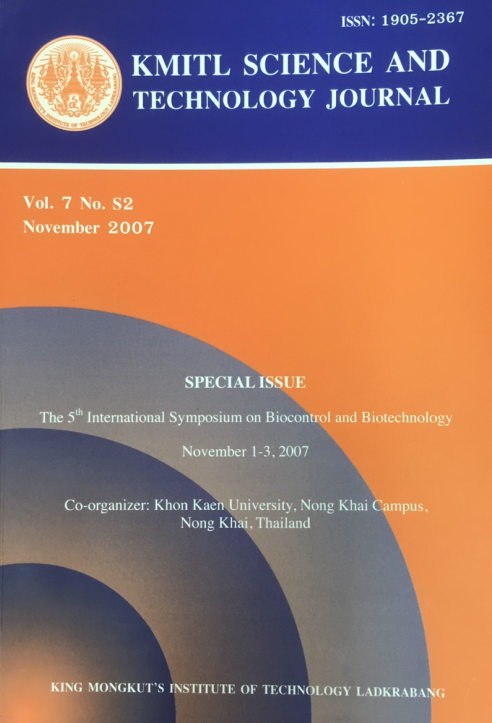THE BATCH ETHANOL FERMENTATION OF JERUSALEM ARTICHOKE USING SACCHAROMYCES CEREVISIAE
Main Article Content
Abstract
The potential of using Jerusalem artichoke (Helianthus tuberosus L.) grown in Thailand as substrate for fuel ethanol production was evaluated in this study. Chemical composition analysis of the plant juices extracted from its tubers was investigated and the results reveal that its contained 256.3 g/l total sugars, 74% of which is inulin. The plant juices also contained several minerals essential for growth and ethanol fermentation by ethanol-producing microorganisms. The highest mineral contents were nitrogen (2,431.5 mg/l) and potassium (2,491.8 mg/l). The batch ethanol fermentation of the acid hydrolyzed plant juices using Saccharomyces cerevisiae was determined and the maximum ethanol concentration, ethanol yield, and ethanol productivity of 88.1 g/l, 0.45 g/g, and 1.84 g/l.h, respectively, were obtained under the optimal conditions: 250 g/l initial sugar concentration, pH 5.0-5.5 and 108 cell/ml initial yeast cell. The conversion efficiency of the fermentation of Jerusalem artichoke juices was approximately 88% of the theoretical ethanol yield.
Keywords: Jerusalem artichoke, ethanol fermentation, Saccharomyces cerevisiae
Corresponding author: E-mail: panpak_2@hotmail.com
Article Details
Copyright Transfer Statement
The copyright of this article is transferred to Current Applied Science and Technology journal with effect if and when the article is accepted for publication. The copyright transfer covers the exclusive right to reproduce and distribute the article, including reprints, translations, photographic reproductions, electronic form (offline, online) or any other reproductions of similar nature.
The author warrants that this contribution is original and that he/she has full power to make this grant. The author signs for and accepts responsibility for releasing this material on behalf of any and all co-authors.
Here is the link for download: Copyright transfer form.pdf
References
[2] Kosaric, N., Cosentino, A., Wieczorek, A. and Duvnjak, Z. 1984 The Jerusalem Artichoke as an Agricaultural Crop. Biomass, 5, 1-36.
[3] Miller, G.L., 1959. Use of Dinitrosalicylic Acid Reagent for Determination of Reducing Sugar, Analytical Chemestry, 31, 416-428.
[4] Dobois, M., Gills, K.A., Hamilton, J.R., Robert, P.A. and Smith, F., 1956 Colourimetric Method for Determination of Sugar and Related Substances, Analytical Chemistry, 28, 350-356.
[5] Katarzyna Szambelan, Jacek Nowak and Krystyna J. Chraokowa. 2004 Comparison of Bacterial and Yeast Ethanol Fermentation Yield from Jerusalem Artichoke (Helianthus Tuberosus L.) Tubers Pulp and Juices, Acta Sci Pol., Technol. Aliment. 3(1) 45-53.
[6] Schorr-Galindo S., Ghommidh C. and Guiraud J.P. 2000 Influence of Yeast Flocculation on the Rate of Jerusalem artichoke Extract Fermentation. Current Microbiology. 41: 89-95.
[7] Nakamura T., Ogata Y., Hamada S. and Otha K. 1996 Ethanol Production from Jerusalem Artichoke Tubers by Aspergillus niger and Saccharomyces cerevisiae, Journal of fermentation and bioengineering. 81(6) 564-566.
[8] Kazuyoshi, O., Shigeyuki, H. and Toyohiko, N. 1993 Production of High Concentration of Ethanol from Inulin by Simultaneous Saccharification and Fermentation using Aspergillus niger and Saccharomyces cerevisiae, Applied and Environmental Microbiology. 59(3) 729-733.


